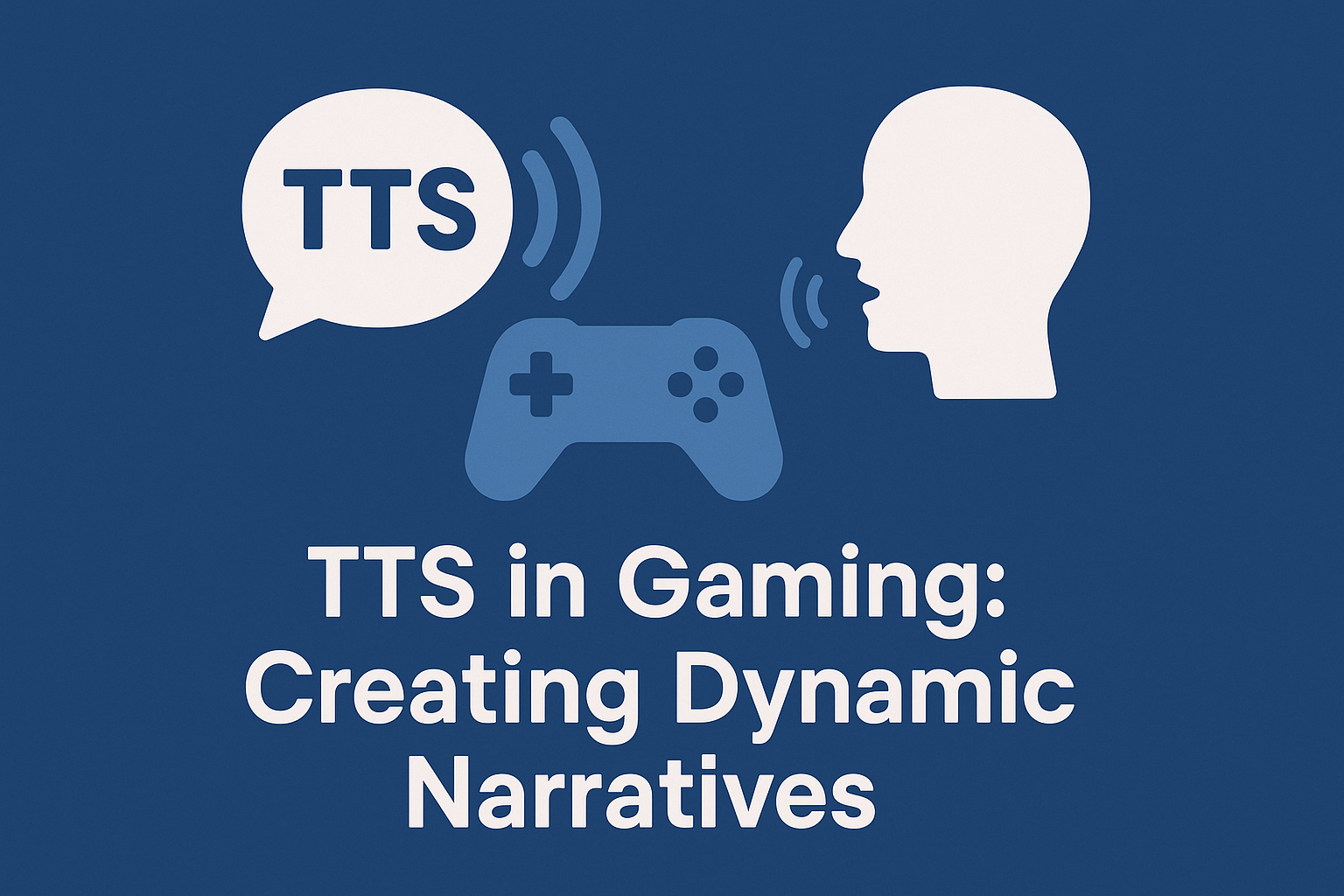Games are no longer just about graphics and controls—they’re about storytelling that pulls you in.
Text-to-Speech (TTS) technology is giving game developers the power to craft immersive, real-time dialogues that adapt to every player’s journey. From indie titles to open-world epics, TTS is helping characters speak, react, and evolve like never before.
This blog explores how TTS is shaping dynamic narratives in modern gaming, making each experience more engaging, personalized, and unforgettable.
The Role of TTS in Gaming Development

The role of TTS in gaming development is to bring characters to life with real-time voice generation. It allows game developers to create dynamic, spoken dialogues using AI instead of recording every line with human actors.
Unlike traditional voice acting, which takes time and budget for casting, recording, and editing, Text-to-Speech (TTS) generates natural-sounding voices instantly from text. This helps both indie and large game studios speed up development and reduce costs.
Indie developers get access to professional-sounding voices without hiring actors, while large studios can test and update scripts on the fly. TTS also supports multilingual voices, making it easy to localize games and reach more players worldwide.
Core Benefits of Using TTS in Games
A. Dynamic and Real-Time Narratives
TTS helps create character speech instantly from user actions or game conditions. It enables flexible storytelling that adjusts in real time based on player choices, increasing engagement.
B. Reduced Voice Production Costs
Games no longer need costly recording sessions for every line. Developers can scale voice content across many characters and scenes using TTS, saving time and budget.
C. Accessibility and Localization
TTS makes games easier to play for visually impaired users by converting text to audio. It also allows seamless language switching, helping players enjoy games in their preferred language.
How Developers Use Speechactors in Gaming

Developers use Speechactors in gaming to create real-time voice dialogues that feel natural and immersive. With Speechactors’ powerful AI voice engine, developers can generate voices instantly, matching in-game actions and story moments without needing manual recordings.
It supports a wide range of custom tones, emotional expressions, and languages, making every character sound unique and alive. Developers love how easy it is to connect Speechactors with popular game engines like Unity and Unreal, allowing them to sync voice with gameplay events.
Whether it’s a battle scene or a calm dialogue, Speechactors helps developers build dynamic, engaging narratives that respond to the player in real time.
FAQs
Can TTS match the emotional depth of human voice actors?
TTS can now express emotions like joy, sadness, or excitement using advanced AI models. New neural TTS systems, such as Speechactors, use real human speech data to deliver voices that sound natural and emotionally rich in many use cases.
How does Speechactors ensure voice quality in gaming?
Speechactors ensures voice quality in gaming by using advanced AI models that deliver natural, high-definition voices with real-time rendering. It supports emotional tones, smooth transitions, and clear pronunciations to keep in-game dialogues immersive and lifelike.
Is real-time TTS viable for mobile games?
Yes, real-time TTS is viable for mobile games with today’s fast processors and optimized TTS engines like Speechactors. It helps create live dialogues, supports multiple languages, and improves accessibility without affecting game performance.
Does using TTS impact game performance?
Using TTS has minimal impact on game performance because modern engines handle audio processing efficiently. TTS runs alongside other tasks, using very little memory or CPU. Most games easily manage real-time voice generation without lag.
What languages and voices are available on Speechactors for games?
Speechactors supports 130+ languages and dialects with 800+ lifelike voices, including male, female, and child tones. Game creators can pick from different accents, emotions, and speeds to match their story style easily.
Conclusion
Text-to-Speech (TTS) technology is transforming how stories are told in gaming, making narratives more immersive, adaptive, and real-time. By enabling developers to generate lifelike dialogues on the fly, TTS breaks traditional storytelling limits.
Speechactors stands out as a powerful and flexible solution, offering customizable voices that match any game style or emotion. Whether you’re designing RPGs, simulations, or educational games, Speechactors brings your characters to life with dynamic audio narration.
Start using Speechactors today to unlock a new level of storytelling in your game.
